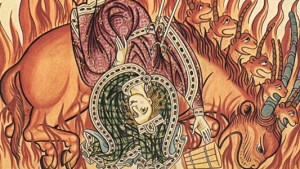The Song of Songs (sometimes called the “Song of Solomon” or the “Canticle of Canticles”) is one of the most controversial books of the Bible. While it has remained a part of the canon of scripture since the 4th century, some religious leaders in the past have banned the reading of the book because of its “explicit” content.
At the same time, the book is highly quoted by countless saints and was a favorite of many mystics, who spent hours and hours in prayer meditating on its spiritual symbolism.
How is the average reader supposed to understand this book?
Similar to the Psalms, the Song of Songs is a collection of poetry. Various traditions claim it was written by King Solomon, though most biblical scholars can’t pinpoint a specific author or the exact time period it was created.

Read more:
How to read Psalms that appear to glorify violence
St. John Paul II is one of the most well-known advocates of this book and gave his guide to reading it during a general audience in 1984. He explains how the Song of Songs can only be read, “along the lines of what is written in the first chapters of Genesis, as a testimony of the beginning.” John Paul II refers to the following verses in Genesis as the key to understanding the Song of Songs.
Then the man said,
“This at last is bone of my bonesand flesh of my flesh;she shall be called Woman,because she was taken out of Man.”
Therefore a man leaves his father and his mother and cleaves to his wife, and they become one flesh. And the man and his wife were both naked, and were not ashamed. (Genesis 2:23-25)
This situates the Song of Songs as a primary expression of “true” love experienced between a man and a woman in the sacrament of marriage. It is a love unsullied by original sin, full of a passion that unites the lovers together as one. This love is not one of lust, but a pure love of desire.
Pope Benedict XVI confirms this reading of the Song of Songs, explaining some of its background in his encyclical God Is Love. He writes, “According to the interpretation generally held today, the poems contained in this book were originally love-songs, perhaps intended for a Jewish wedding feast and meant to exalt conjugal love.”
Yet, while the book appears to focus on this type of carnal love, it is meant to go much deeper. John Paul II explains that, “The words, movements and gestures of the spouses correspond to the interior movement of their hearts. It is possible to understand the language of the body only through the prism of this movement.”
Furthermore, the erotic love that is highlighted is transformed into a self-sacrificing love, showing an integral link between the two types of love. Benedict XVI explains how in the Song of Songs, “Love now becomes concern and care for the other. No longer is it self-seeking, a sinking in the intoxication of happiness; instead it seeks the good of the beloved: it becomes renunciation and it is ready, and even willing, for sacrifice.”
Besides being an example of the ideal love shared between spouses, the Song of Songs is further interpreted as a representation of how God love us. Pope Benedict summarizes this belief that was popular among the mystics of the Church.
We can thus see how the reception of the Song of Songs in the canon of sacred Scripture was soon explained by the idea that these love songs ultimately describe God’s relation to man and man’s relation to God. Thus the Song of Songs became, both in Christian and Jewish literature, a source of mystical knowledge and experience, an expression of the essence of biblical faith: that man can indeed enter into union with God—his primordial aspiration. But this union is no mere fusion, a sinking in the nameless ocean of the Divine; it is a unity which creates love, a unity in which both God and man remain themselves and yet become fully one. As Saint Paul says: “He who is united to the Lord becomes one spirit with him” (1 Cor 6:17).
This is why the Song of Songs is a popular book among both married couples and single persons. In fact, most of the saints who praised this book were consecrated religious men and women, who never experienced the love of marriage.
Above all, the poetry contains a profound insight into God’s love for us, revealing a God who desires us and seeks after us. The Song of Songs reveals a God who recognizes our beauty and wants to unite with us in an everlasting spiritual union.

Read more:
Marriage, sex, and prayer: what the Scriptures say

Read more:
Why are the Psalms numbered differently?

